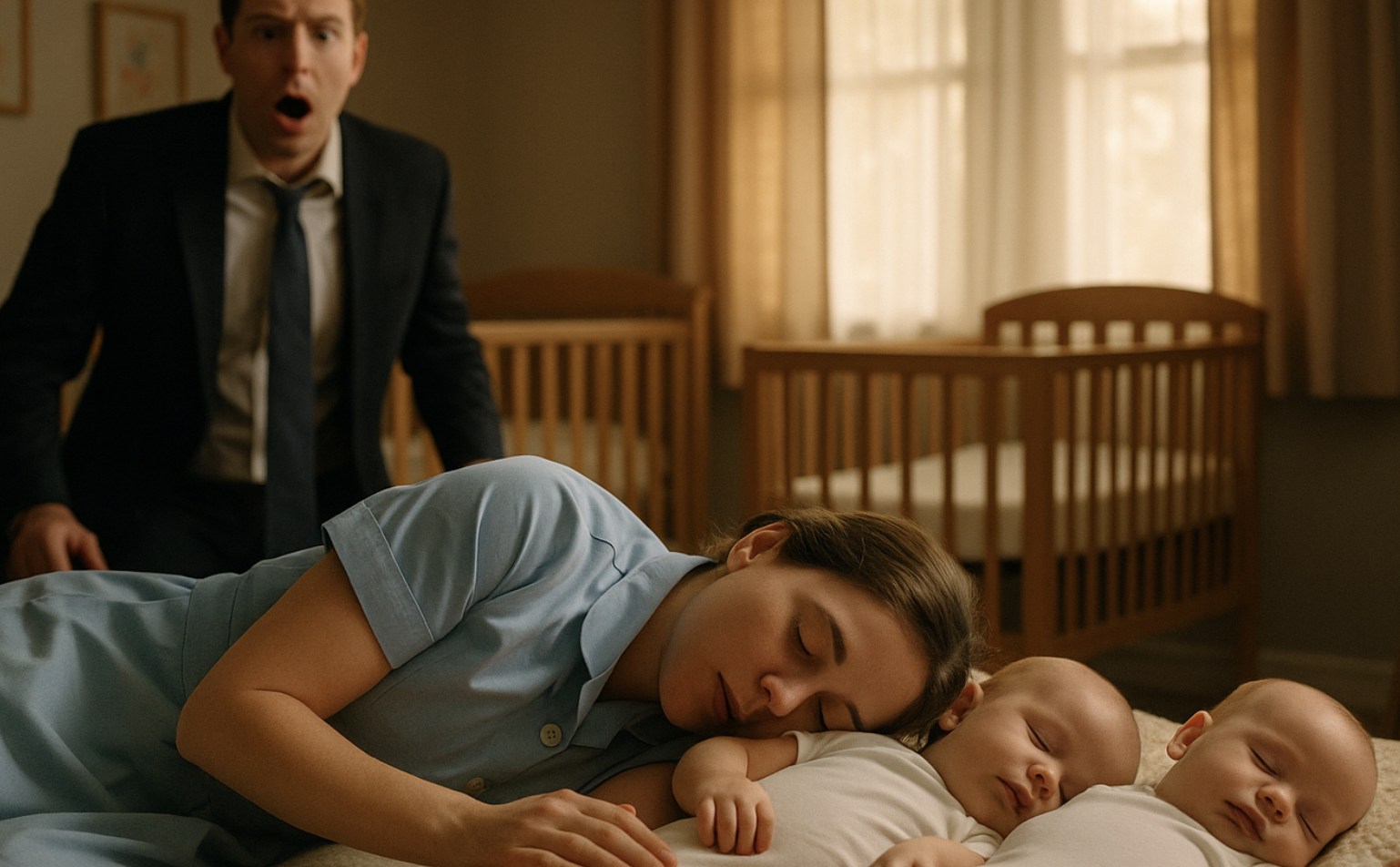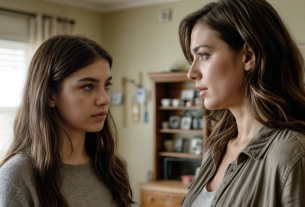The silence of the night was shattered like a crystal bell by twelve strokes from the antique mantel clock—an heirloom sentinel on the fireplace. Each strike was heavy and ringing, as if cast from pure time itself, and it thudded in his temples with a dull ache. Arthur Vandermond—whose name in business circles was spoken with a sigh and a stab of envy—pushed open the massive oak door of his mansion. The lock clicked with a soft, commanding sound, as if declaring: the day is over, you may exhale. But he couldn’t.
His steps—precise and measured—rolled in echo across the icy marble floor, underscoring the oppressive emptiness of the halls. Fingers accustomed to gripping an expensive pen or flipping through stacks of contracts now mechanically loosened a silk tie. He could still feel the day’s pressure upon him—endless meetings, exhausting negotiations, partners’ looks full of covert obsequiousness and searing jealousy. He was Arthur Vandermond—a fortress of a man, a living legend. But in these small hours the fortress turned into a shell, and the legend—into a very tired, very lonely man.
And tonight something was wrong. Wrong with the very fabric of reality in his impeccable, calibrated-to-the-last-detail world.
The silence—the grave, perfect silence he adored after the city’s clamor—was gone. In its place was something else: barely perceptible yet insistent. A soft rustle of breathing, a low, almost inaudible hum from somewhere within, and… a steady, hypnotic rhythm. As if two tiny metronomes were ticking in unison. Two small hearts. Their beating tugged him, with an invisible thread, toward the living room, steeped in half-light. He drew his perfectly groomed brows together. The twins—his cherished sons, Lewis and Leo—ought to have been asleep long ago in their luxurious nursery on the second floor, under the vigilant gaze of their expensive night nurse.
Carefully, with a wariness that woke in him unbidden, Arthur moved toward the call. His mirror-polished shoes sank noiselessly into the thick pile of the Persian rug, swallowing even the ghost of sound. And then he froze—turned to stone—caught on the threshold of the living room in a silent cry.
The scene before him knocked the breath, the certainty, the swagger clean out of him.
In the warm, honeyed glow of a table lamp, on the floor—right on the costly carpet—lay a young woman in a simple, even shabby, turquoise cleaning uniform. Her head rested on a neatly folded small towel, and her long dark lashes—like butterflies wet with tears—lay upon pale cheeks. She slept the bottomless sleep of utter exhaustion. Curled beside her like two little kittens, his six-month-old treasures, the twins, were wrapped in the softest cashmere blankets. Their tiny pink fists, with the unconscious tenacity of infants, had latched onto her fingers—one gripped her index, the other her little finger—as if afraid to let go of their anchor of safety. The second boy had nestled his head against her chest, and his even breathing spoke of the deepest, most serene peace—possible only beside the beat of another, sheltering heart.
She was not the nurse. The nurse wore starched whites and smelled of expensive perfume. This woman was a cleaner. A shadow that slipped soundlessly along corridors—a face he might never have bothered to truly see.
Arthur’s heart—so used to stock-market tempests—suddenly pounded with the pain and force of a detonating bomb. What was she doing here? With his children? Who had allowed it?
For a moment, the predator inside him—the master of this empire called “the Vandermond estate”—stirred and roared: fire her on the spot, call security, throw her out, demand the housekeeper’s head for such disorder. But before those thoughts could harden into orders, his gaze slid back. He saw Lewis, in his sleep, clutch her finger tighter, and a shadow of a smile flicker across the baby’s face. He saw Leo, pressed against her, sigh with such boundless trust as Arthur had never seen in their eyes when turned to him.
And the anger—searing, righteous—dried up, giving way to something cold and heavy that slowly filled him from within. On the woman’s face, stilled in the calm of sleep, he saw fatigue—not the light weariness of work well done, but the kind that eats at the soul; the kind that comes from giving yourself away hour after hour, day after day, to the last drop, with no remainder and no right to weakness.
He drew a deep, effortful breath—the air suddenly thick and heavy—and could not tear his eyes from this silent tableau that was flipping his world on its head.
The next morning, as the sun’s golden rays brushed the parquet of his study, Arthur summoned Mrs. Emily, the head housekeeper, a woman with a waxen face and steel composure.
“Who was she?” His voice came out softer than he intended, stripped of its usual command—only a taut string of perplexity. “And tell me, for heaven’s sake, why a cleaning woman was with my sons in the night?”
Mrs. Emily, usually imperturbable, faltered for a heartbeat; her fingers unconsciously pleated the folds of her immaculate apron. “Her name is Camilla, sir. She’s been with us only a few months. Very conscientious, very quiet. Last night Miss Claire, the nanny, felt a sudden indisposition and had to leave early. Likely, as Camilla was finishing her work, she heard the babies crying… and stayed with them. Until they fell asleep.”
Arthur frowned again; a mind built on logic and efficiency balked at the absurdity. “But why on the floor? Why did she herself fall asleep there like… like a stray dog?”
“Because, sir,” Mrs. Emily’s voice softened, and something strange—uncharacteristic warmth—glimmered in her eyes, “she has a little daughter of her own. About five. Camilla works double shifts, almost without days off, to pay for a private speech-therapy preschool. The child has speech difficulties. I think she simply… misjudged her strength. She just ran out of it.”
Something within Arthur—an old ice-sheathed ledge of indifference—split with a crash. He had thought of Camilla as a function, a nameless entry on a payroll sheet. Now a living person stood before him in his mind—a mother, alone, fighting the harsh winds of the world in silence, and yet finding the strength to bring comfort and peace to someone else’s children.
That evening he found her in the half-basement laundry room, where the air was warm and steamy, scented with soap and freshness. She stood at a huge table, folding a mountain of snow-white sheets with near-mechanical, practiced precision. Seeing him, Camilla froze, and all color drained from her face, leaving it gray and frightened.
“Mr. Vandermond, I… I am infinitely sorry,” she breathed, her hands—clutching a corner of the sheet—trembling with a fine, treacherous shake. “I didn’t mean to break the rules. I had no right. But the babies were crying so inconsolably… and the nurse wasn’t there, and I thought that if I just sat with them for a minute…”
“You thought my sons needed someone,” Arthur interrupted softly, almost in a whisper. His own voice sounded foreign to him.
Camilla’s eyes—large and hazel like ripe nuts—filled at once with moisture, but she held her gaze steady, refusing to let the tears fall. “Please don’t dismiss me. I swear it won’t happen again. I just… physically couldn’t bear the sound of their lonely crying.”
Arthur looked at her for a long, long time in silence. She was so young—no more than twenty-five by the look of her—but her face already bore the stamp of constant, soul-sapping fatigue: those little rays at the corners of the eyes and a faint crease between the brows that come not from age but from the weight of responsibility. And yet there was no trace of obsequiousness, no self-pitying fear—only pure, naked concern for those two little boys.
At last he spoke, each word measured and deliberate: “Camilla, do you know what you gave my children last night?”
She blinked in confusion, searching for the trap. “I… I just rocked them. Helped them fall asleep.”
“No,” Arthur shook his head, and his voice wavered. “You gave them something no money in this world can buy. You gave them living, human warmth. You gave them the feeling of safety.”
Camilla’s lips parted in astonishment, but no sound came. She lowered her head, and this time two bright drops slid down her cheeks and fell upon the flawlessly pressed sheet, leaving small dark spots on the fabric.
That night, Arthur Vandermond—one of the city’s most powerful men—sat alone in the grand, luxuriously appointed nursery, watching his twins sleep. For the first time in many months, perhaps years, his soul was bound not by the familiar sense of emptiness, but by a sharp, gnawing, tormenting guilt. He had provided everything. The world’s finest cribs of eco-friendly wood, clothes of the softest cashmere, imported formula flown in from Switzerland. But he, their father, was not there. He was always on the move, always closing another deal, building another financial empire, buying another island in the ocean of success.
But his children—his very flesh and blood—did not need those islands. They needed firm shore. They did not need more wealth. They needed presence. They needed love. Simple, unconditional love—the kind measured not in checks, but in hugs, in time spent together, in reading a bedtime story.
And a simple cleaning woman, a penniless stranger, had shown him that searing, blazing truth with a silent act.
The next morning he invited Camilla to his study again. Sunlight falling through the tall stained-glass window painted bright, multicolored patches on the oak floor.
“You are not dismissed,” Arthur said firmly, looking straight into her eyes. “On the contrary. I want you to stay. But not as a cleaner. As the person to whom I can entrust the most precious thing I have—the hearts of my sons.”
Camilla’s eyes widened in shock; she seemed not to believe her ears. “I… I don’t quite understand, sir.”
The corners of Arthur’s mouth trembled in the faintest smile. “I know you’re raising your daughter alone. And I know about her… needs. From this moment, her speech therapy and all of little Alice’s schooling are fully covered. Moreover, your shifts will be cut in half. You deserve time with your child. You deserve to be happy.”
Camilla pressed a trembling hand to her lips, as if to hold back a surge of feeling. Tears streamed down her face in a silent rivulet. “Mr. Vandermond… it’s too much. I can’t accept such generosity.”
“You can,” he said gently but leaving no room for argument. “Because you’ve already given me something beyond price. You gave me back my sight. You taught me to see again what truly matters.”
Months flowed, turning like pages in a newly opened book. And the Vandermond mansion—cold, pristine palace that it was—began, little by little, to change. It wasn’t just cleaner or brighter. It filled with something elusive yet vital—warmth.
Little Alice, Camilla’s daughter—a shy girl with big eyes—was now often at the mansion. She played with the twins in the green garden, and her soft, still imperfect babble mingled with the babies’ cooing. Arthur spent nearly every evening at home. He set aside stacks of documents and reports, so he could hear not the nannies’ accounts but the ringing, contagious laughter of his sons, who had begun to recognize him and reach for him with their little hands.
And each time he saw Camilla with the twins—how gently she rocked them in her arms, how she whispered tender things, how patiently she taught them to tell colors and shapes—he was seized by a strange, humble gratitude. She had entered his home as a shadow, a servant, yet had become something immeasurably greater: a living reminder, a silent guardian angel, who showed him that true, enduring wealth is measured not in account balances but in the amount of love one can give and receive.
One evening, as the first city lights kindled outside, Arthur himself was settling the boys into their cribs. He had just read them a story, and the room rested in peaceful hush. In that hush, clear and bright as a little bell, came Leo’s voice. He looked straight at Camilla, standing in the doorway with a smile, and uttered his first conscious word:
“Ma-ma…”
Arthur met Camilla’s eyes. She froze, covering her mouth with her hand, and once again tears—this time of happiness—ran down her face.
Arthur smiled softly, and there was not a drop of jealousy in his heart, only boundless, all-encompassing gratitude. “Don’t worry, Camilla,” he said. “They now have two mothers. One who gave them life. And another who gave them her heart.”
Arthur Vandermond had once believed devoutly that success was endless boardrooms, the clatter of rising and falling quotes, and numbers in safe-deposit boxes. But in the quiet, love-filled nursery of his children—in the very night he least expected it—he discovered a greater truth, one that could raise goosebumps even on the most calloused soul:
Sometimes the richest people in the world are not those with the most money, but those whose hearts can love boundlessly—without measure and without conditions. And that love is the only currency that never devalues.



